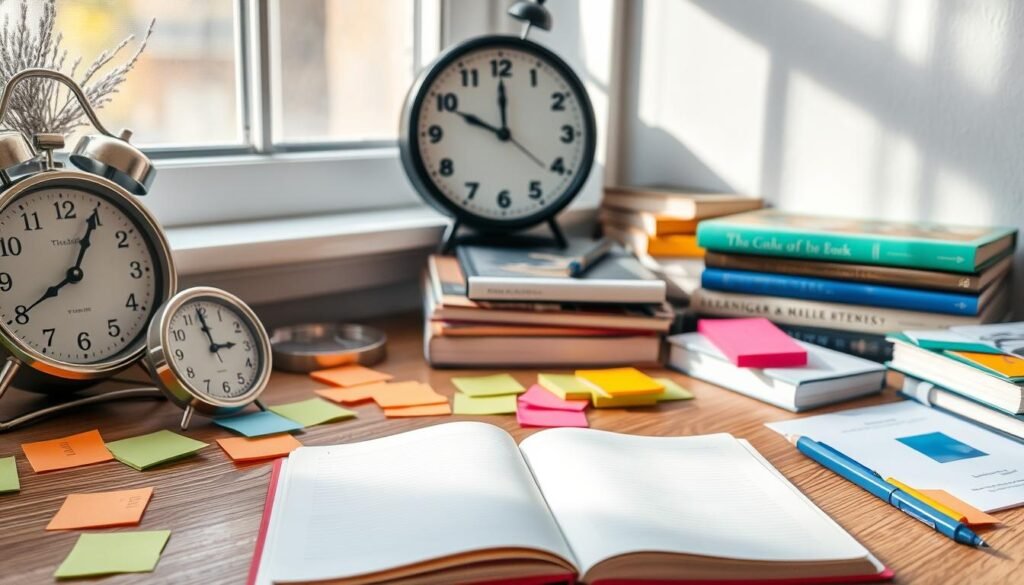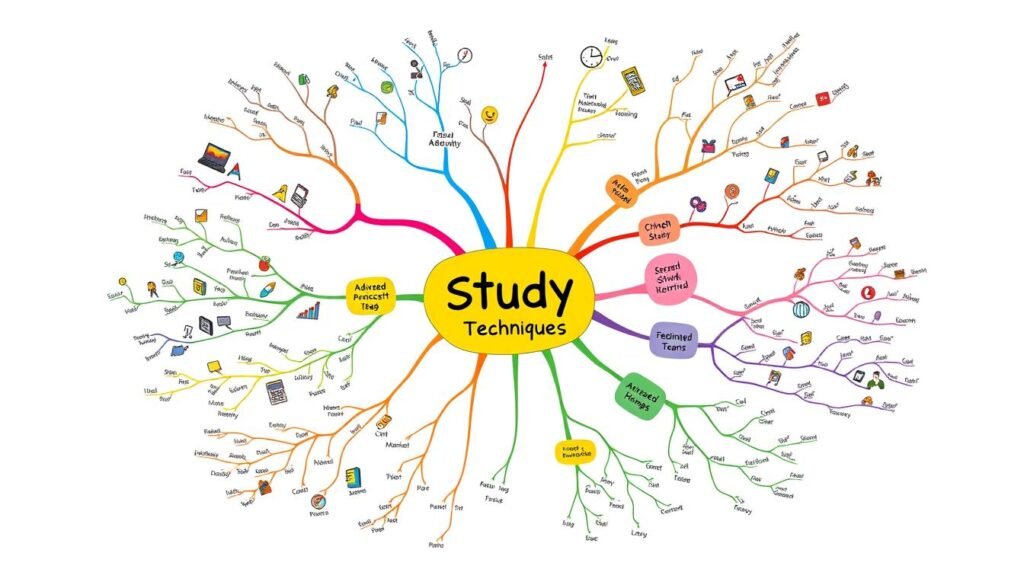University Study Tips Going from high school to college can be really tough for many students. It’s important to use study methods that work for different learning styles. Jessie Schwab, a psychologist at Harvard University, says just memorizing stuff doesn’t mean you really get it.
Getting ready early and finding help are key to doing well in college. Many students cram for exams, but research shows it doesn’t help much in the long run. Making a study plan with clear goals helps students stay focused and feel ready.
Getting help from teachers, tutors, and friends is something many college students do. The guide to pursuing a biology major shows this. Harvard’s Academic Resource Center also helps students learn good study habits and strategies for success.
Key Takeaways
- Effective study methods engage multiple learning styles for long-term retention
- Cramming is ineffective for long-term learning, while creating a structured study plan is crucial
- Seeking support from professors, tutors, and classmates is common and beneficial in college
- Harvard’s Academic Resource Center offers various support services to help students develop effective study habits
- Transitioning to university-level coursework requires overcoming challenges like procrastination
Understanding the Foundations of Effective Learning
Going from high school to university is a big change. College professors are less involved than high school teachers. Also, exams are more important, and the reading is harder. So, active studying is key for doing well.
The Difference Between Reading and Active Studying
Just reading isn’t enough; you need to be active to learn well. Good studying includes making study guides, teaching others, and using concept maps. These help you remember things better than just re-reading notes.
The Importance of Sleep and Environment
Sleep is crucial for doing well in school. Not getting enough sleep can hurt your body and mind quickly. Also, where you study matters a lot. Even if you can’t study in silence, getting rid of distractions helps a lot.
Pre-Study Preparation Techniques
Getting ready to study is important. Turn off your phone or put it away. Eating foods that help your brain is also good. Plus, asking professors for help or using tutoring can really help you understand your classes.
Learning these key points can help university students study better. It leads to doing well in school and achieving success.
University Study Tips That Transform Academic Performance

Doing well in university is more than just reading a lot and studying hard. To really shine, you need to use smart study methods and manage your time well. Here are some tips to boost your grades.
Distributed practice, or spreading out your study time, beats cramming. Short, intensive study sessions of 30-45 minutes are better than long ones. Also, testing yourself helps you learn faster.
Not everyone likes studying in silence; some do better with background noise. For tech subjects, solving problems is key, not just reading. But, don’t try to do too many things at once; it messes up your focus and learning.
- Prioritize distributed practice over intensive cramming sessions for better retention.
- Engage in short, focused study sessions of 30-45 minutes for optimal productivity.
- Incorporate self-testing as an active learning strategy to improve efficiency.
- Experiment with different study environments, including background noise, to find what works best for you.
- Prioritize problem-solving over passive reading for technical courses.
- Avoid multitasking during study sessions to maintain focus and learning quality.
By using these study tips, you can change your academic game and reach your study goals.
“Effective time management is the key to academic success. By prioritizing your studies and creating a structured daily routine, you can maximize your productivity and achieve your goals.”
Advanced Study Techniques for Better Retention

As you go through university, learning advanced study techniques can really help. The SQ3R method, the Feynman Technique, and mind mapping are great for keeping information in your mind. They help you do your best in school.
The SQ3R Method Explained
The SQ3R method is a smart way to study. It means Survey, Question, Read, Recite, and Review. First, you look over the material to understand its structure and main points.
Then, you make questions to help you focus while reading. The “recite” step is key because it makes you say out loud what you’ve learned. Lastly, reviewing what you’ve studied helps you remember it better.
Implementing the Feynman Technique
The Feynman Technique is named after physicist Richard Feynman. It’s about explaining things in simple words. By teaching yourself or others, you really get to know the subject.
This method not only helps you remember better but also makes you better at explaining complex ideas.
Using Mind Mapping for Complex Topics
Mind mapping is a visual way to learn. It helps you connect different ideas. For hard topics, mind mapping is very useful.
It lets you see how everything relates. Using colors, pictures, and layout, mind maps make learning fun and easy to remember.
Using these advanced study techniques can change your school experience. The SQ3R method, the Feynman Technique, and mind mapping can help you reach your highest potential. They lead to great success in school.
Maximizing Study Session Productivity

University students need to boost their study session productivity to succeed. The first step is to cut out distractions. This means no social media, texting, or other digital distractions. Apps that limit website time can help keep focus sharp.
Having a dedicated study area is key for staying focused. Studies show that changing where you study can affect your focus and memory. Universities have many study spots, from quiet libraries to busy coffee shops. This lets students pick the best spot for them.
- Turn off your phone during study sessions to avoid interruptions.
- Reward intensive studying with brief, timed breaks to stay motivated.
- Listen to calming music, such as classical or lo-fi beats, to improve focus.
- Set SMART (specific, measurable, achievable, relevant, and time-bound) goals for each study session.
By using productivity techniques, focused studying, and good time management, students can improve their grades. They can reach their academic goals.
| Productivity Technique | Benefit |
|---|---|
| Pomodoro Technique | Working for 25 minutes followed by a 5-minute break to enhance productivity |
| Decluttering Study Area | Promotes a clear and focused mindset for better concentration |
| Establishing Study Routines | Builds habits and increases productivity through consistency |
“Consistent study routines help in building habits and increasing productivity.”
Also Read: A Step-by-step Guide To The University Application Process
Conclusion
Effective studying is more than just reading books. It’s about actively engaging with what you learn, practicing regularly, and using techniques that work for you. Methods like SQ3R, the Feynman Technique, and mind mapping help a lot. They make sure you remember and understand what you study.
Good sleep, a great study space, and managing your time well are also key. These habits help you do well in school and set you up for success later on.
These tips aren’t just for school. They help you learn for life and grow in your career. By using these strategies, you can reach your highest potential. This prepares you for success in both school and your future career.
FAQs
Q: What are the best study tips for university students?
A: The best study tips for university students include creating a study plan, taking notes effectively, forming a study group, and utilizing flashcards to retain information. It’s also important to set specific goals and stay focused during study sessions.
Q: How can I study effectively for exams?
A: To study effectively for exams, consider using a combination of study methods such as re-reading course material, practicing retrieval with quizzes, and testing your knowledge with flashcards. Make sure to create a study schedule that allocates time for each subject.
Q: What is the best way to study in a group?
A: The best way to study in a group is to form a study group with fellow students who are motivated and committed. Organize sessions where everyone can take turns teaching each other important information, discuss complex topics, and quiz each other to reinforce learning.
Q: How can I take good care of my study space?
A: To take good care of your study space, keep it organized and free from distractions. Ensure that it is well-lit and equipped with all the necessary materials. A clean and organized space will help you stay focused and make the most of your study time.
Q: What are effective ways to take notes during lectures?
A: Effective ways to take notes during lectures include using bullet points for key concepts, summarizing information in your own words, and highlighting important details. Consider using visual aids like diagrams or mind maps to enhance your understanding of the material.
Q: How can I reduce stress while studying?
A: To reduce stress while studying, incorporate regular breaks into your study schedule, practice mindfulness techniques, and ensure you’re taking care of your physical health. Engaging in light exercise or enjoying an episode of your favorite show can also help relieve stress.
Q: How should I set specific goals for my studies?
A: Setting specific goals for your studies involves identifying what you want to achieve in each study session. Break down larger tasks into smaller, manageable goals. For example, aim to complete a chapter, master a particular concept, or create flashcards for key terms.
Q: What learning techniques can help me memorize information better?
A: Learning techniques that can help you memorize information include using flashcards, practicing spaced repetition, and engaging in active recall through quizzes. Additionally, trying to relate new information to what you already know can enhance memorization.
Q: Why is it important to test your knowledge regularly?
A: Testing your knowledge regularly is important because it reinforces what you’ve learned and helps to identify areas where you need improvement. Practice tests and quizzes can also enhance your retention and prepare you for the types of questions you may encounter in exams.
Q: How can a tutor help me study effectively?
A: A tutor can help you study effectively by providing personalized support tailored to your learning style. They can clarify difficult concepts, help you develop study skills, and guide you through study strategies that set you up for success.
Source Links
- https://summer.harvard.edu/blog/top-10-study-tips-to-study-like-a-harvard-student/
- https://www.usa.edu/blog/study-techniques/
- https://learningcenter.unc.edu/tips-and-tools/studying-101-study-smarter-not-harder/
- https://www.uwlax.edu/college-tips/how-to-study-effectively/
- https://learning.northeastern.edu/explore/foundations-of-learning-2/
- https://lpsonline.sas.upenn.edu/features/7-tips-help-you-achieve-academic-success
- https://www.coursera.org/articles/study-habits
- https://www.joyce.edu/blog/study-tips-to-retain-information/
- https://students.dartmouth.edu/academic-skills/learning-resources/academic-resources/memory-retention
- https://www.vu.edu.au/about-vu/news-events/study-space/10-tips-on-how-to-study-effectively
- https://www.cmich.edu/blog/all-things-higher-ed/five-tips-to-improve-your-study-time-efficiency
- https://northlakebh.org/creating-effective-study-spaces-to-maximize-organization-and-peace-of-mind/
- https://www.fullstackacademy.com/blog/6-tips-for-creating-an-effective-study-space
- https://library.sacredheart.edu/c.php?g=29803&p=185935
- https://www.trentu.ca/academicskills/how-guides/how-write-university/writing-introductions-conclusions-and-body-paragraphs/writing-0
- https://www.ncl.ac.uk/academic-skills-kit/writing/academic-writing/writing-introductions-and-conclusions/





